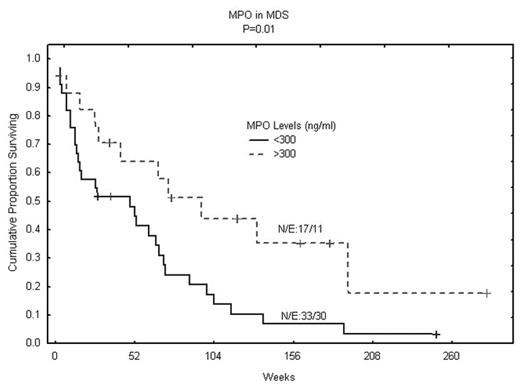Abstract
We previously reported that levels of myeloperoxidase (MPO) enzyme in plasma of patients with acute myeloid leukemia (AML) may correlate with aggressive disease. However, we found poor reproducibility and significant variability from lot to lot when commercially available kits are used. We developed a cytometric beads assay (CBA) for measuring plasma MPO that shows high reproducibility (CV<10%) with no significant variability with time. More importantly, MPO levels as measured using this CBA assay showed better correlation with clinical behavior in AML and myelodysplastic syndrome (MDS). Based on studying plasma levels of MPO in 98 patients with AML and 50 patients with advanced stage MDS, we found no significant difference in plasma MPO between AML and MDS patients. As expected MPO levels were significantly lower in patients with ALL (N=48) than in AML patient (P=0.04) and MDS (P=0.02). While MPO levels were significantly higher in patients with good cytogenetic abnormalities (P=0.004) in AML patients, MPO levels did not differ between intermediate and poor cytogenetic groups in patients with AML or MDS. Unexpectedly we found a difference between AML and MDS in their correlation with MPO levels and clinical outcome. Patients with advanced stage MDS and high levels of MPO (<300 ng/ml) had significantly longer survival than patients with lower levels (P=0.01). Multivariate analysis showed that this correlation with better survival in this group of MDS patients was independent of cytogenetic grouping. In contrast in AML, higher levels of MPO (>70 ng/ml) correlated with shorter survival (P=0.04). Similarly, patients with acute lymphoblastic leukemia (ALL) and high levels of MPO (>70 ng/ml) had shorter survival (P=0.05). Despite there was a correlation between the commercially available kit for measuring MPO and our CBA method (r=0.71, P<0.0001), the commercial kit did not provide robust data for clinical correlation. This data confirms that confirms that plasma levels of MPO play a role in the biology of the leukemia. Further studies are needed to establish if this role is a reflection of an inflammatory process or a reflection of disease load, although the finding of clinical relevance in ALL suggests that it is more likely reflecting an inflammatory process.
Author notes
Disclosure: No relevant conflicts of interest to declare.


This feature is available to Subscribers Only
Sign In or Create an Account Close Modal